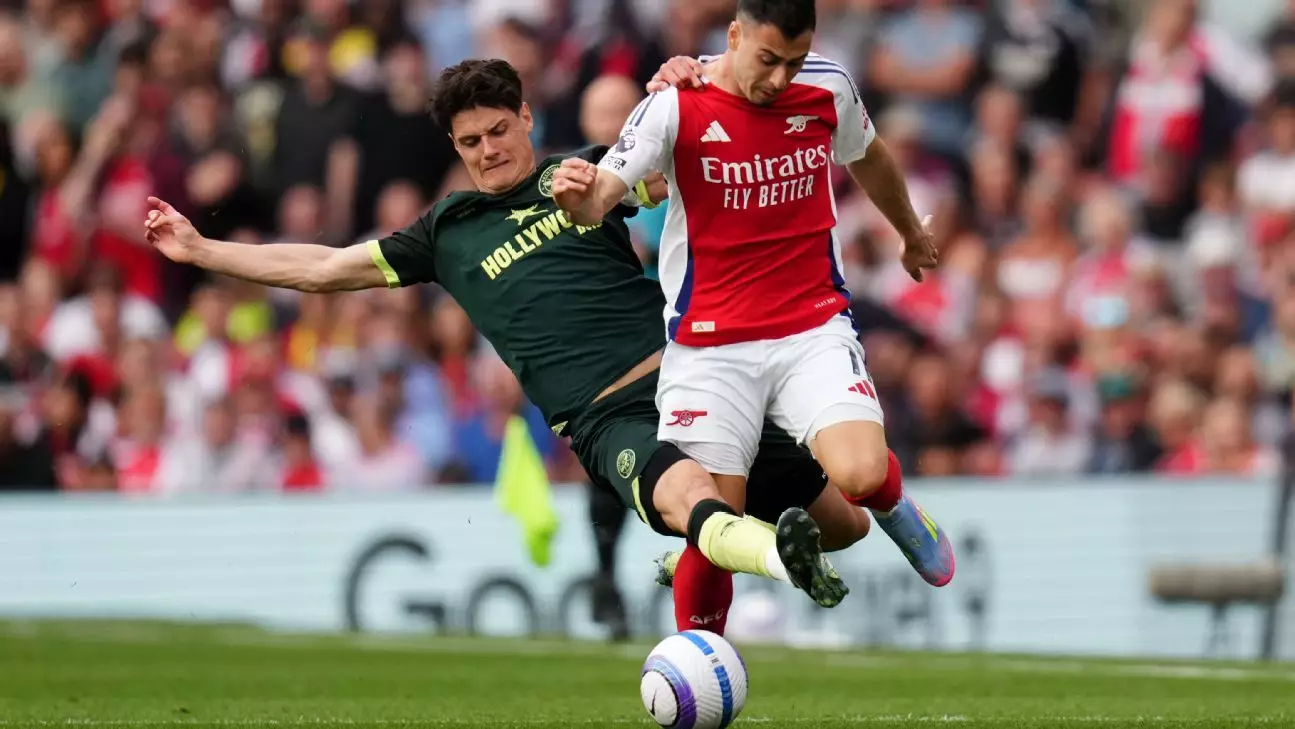In a tightly contested match between Arsenal and Brentford that ended in a 1-1 draw, a single moment of recklessness overshadowed the event: a late tackle by Brentford’s Christian Nørgaard on Arsenal’s winger, Gabriel Martinelli, left fans and commentators in shock. This incident, occurring early in the match, raised not only eyebrows but also the stakes for both teams, illustrating the fine line between aggressive play and dangerous tactics in professional football.
Nørgaard’s attempt to halt Martinelli’s counter-attack by scything him down has been criticized fiercely by Martinelli himself, who expressed concerns about the potential for serious injury. The young winger’s chilling statement that he could have suffered a broken leg speaks volumes about the impact of such tackles on players’ safety. In this high-stakes game, the question remains: should the refereeing staff have intervened more decisively?
The Fallout of the Incident
The aftermath of the tackle saw Martinelli refusing a halftime apology from Nørgaard, emphasizing that the gravity of the action left a lasting impression on him. This moment encapsulated the emotional and psychological intensity of top-tier football. It’s not just about the physical prowess; mental clarity is equally critical in this arena. Referees are charged with maintaining fair play and ensuring player safety, and in this instance, many believe they faltered.
Arsenal’s manager, Mikel Arteta, visibly furious on the sidelines, underscored the gravity of the tactical misstep. A strong yellow card might have sufficed for Nørgaard in the eyes of Brentford’s management, but for Arsenal and their supporters, the implications were far greater. Arteta’s frustration was resonant, not only because of the tackle but also because it introduced uncertainty into an already crucial period for both the team and its players.
Uncertain Future and Team Dynamics
In the larger context of the season, this incident raises questions about the resilience of the Arsenal lineup moving forward, especially with upcoming critical fixtures such as the Champions League quarterfinal matchup against Real Madrid. Both Ben White and Thomas Partey face uncertainties regarding their fitness due to injuries. Arteta’s designation of both players as “doubtful” adds another layer of complexity to the team’s strategy as they prepare for one of their biggest challenges in recent memory.
The blend of thriving under pressure combined with managing a heavy injury list is a delicate balancing act for any coach. Even as they strive for glory in the Champions League—something they haven’t experienced since 2009—factors like Martinelli’s injury scare and the fitness of other stars will significantly shape Arsenal’s route to potential success or failure in this current campaign.
Reflections on Player Safety and Club Dynamics
Beyond the immediate ramifications, this incident brings to light broader issues surrounding player safety and the responsibilities of clubs, referees, and the sport as a whole. Football is known for its intensity, but as the game evolves, there’s an urgency to reassess and enhance safety standards that prioritize the well-being of players. Tackles that risk serious injury should prompt not just penalties but also a cultural shift within the sport to emphasize respect and protection on the field.
This week may define Arsenal’s future, but it has also highlighted a pivotal commentary on the ethics and responsibilities intertwined in professional sports. As fans cling to hope for progress, both in terms of their team’s performance and player safety, the echoes from the Emirates Stadium resonate far beyond the pitch.

Leave a Reply